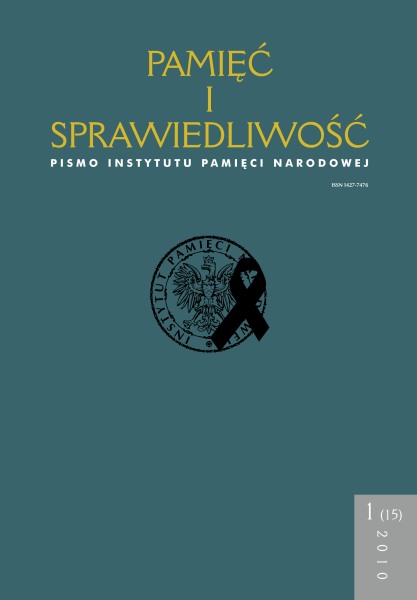Figurant „Tybr” – nieudany werbunek niedoszłego ministra
Pamięć i Sprawiedliwość, Tom 15 Nr 1 (2010), strony: 117-138
Data publikacji: 2010-06-30
Abstrakt
Mieczysław Thugutt (1902–1979), he was trained as a mechanical engineer. Associated with the peasant movement. Son of the famous peasant and social activist, Stanisław. Firstly, during World War II, being in Sweden he mediated between the Polish government-in-exile in London and the Underground in Poland.
Later, from 1942 he was in London. Thugutt was a close cooperator of Minister of Internal Affairs and then of Prime Minister Stanisław Mikołajczyk. He was also the Polish Ministry of Internal Affairs’ supervisor of the clandestine radio station – codeword „Świt” [„Dawn”] broadcasting from Great Britain and pretending
to be a national one. During the negotiations held in Moscow resulted in formation of the Provisional Government of National Unity (Tymczasowy Rząd Jedności Narodowej, TRJN) in June 1945 Thugutt was designated to be Minister of Posts and Telegraphs. However, he refused to return to Poland and did not hold the office. He was a close friend and cooperator of Stefan Korboński. In addition to this Mieczysław Thugutt was one of the activists of the PSL-Odłam Jedności Narodowej [the PSL-Section of the National Unity] (the PSL – the Polish People’s Party) and President of the constituency of Great Britain. In his career he became the editor of the party’s official paper-in-exile, the “Zielony Sztandar” and of the pre-war “Przegląd Techniczny” [Technical Review] – the biggest and oldest technical magazine in Poland. He was a member of numerous structures of the Polish political emigration: the Political Council (1952–1954), the TRJN (1954–1962) and the Federation of Democratic Movements (1962–1979). He was involved in the process of merging emigration circles as well as he was a signatory of the Act of Unification (1954). He was known as a incisive critic of both the immigration structures and of an inflexible attitude of those so-called “unbroken”. Remaining anti-German, Thugutt started referring more positively to the changes that took place in Poland as a consequence of the Polish October. Between 1957–1965
the Department I (intelligence) took an effort to recruit him to cooperate with communist security apparatus (case code-name “Tybr”). However these activities ended in failure, because the figurehead “Tybr” got an intelligence officer to understand clearly that he rejected any contacts with secret services. Since 1965
because of deteriorating health condition he became less active in politics. He never accepted the unification of the immigration peasant movement in 1968. Thugutt did not belong to the “Castle” movement (“Zamek”) nor to the Council of National Unity (Rada Jedności Narodowej, RJN). He died in London, in 1979.
 Język Polski
Język Polski
 English
English
 Deutsch
Deutsch
 Français (France)
Français (France)
 Italiano
Italiano
 Русский
Русский


 PDF
PDF
